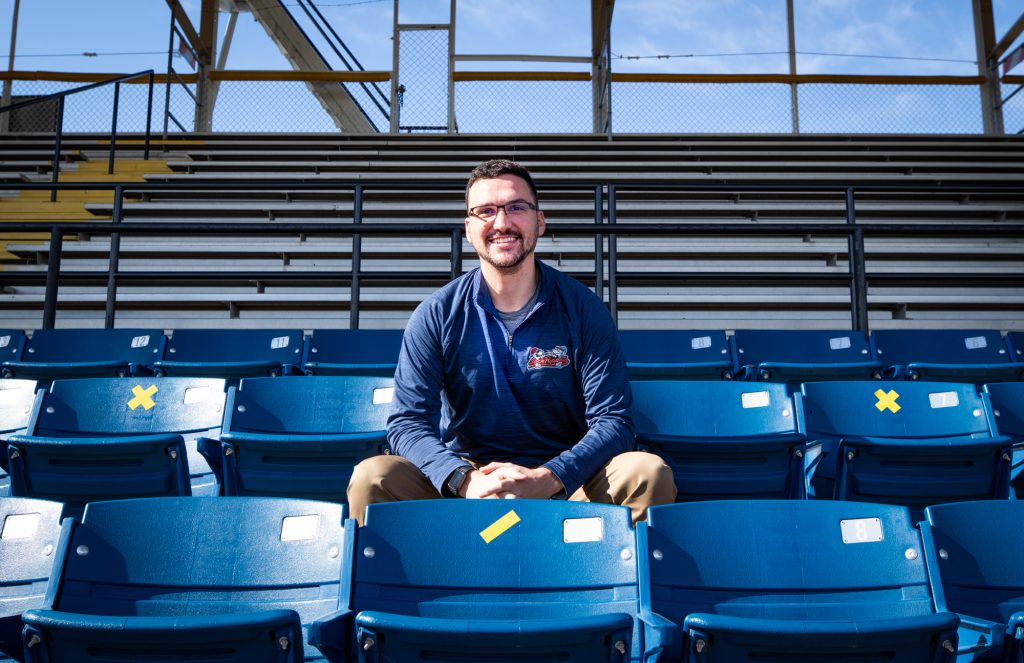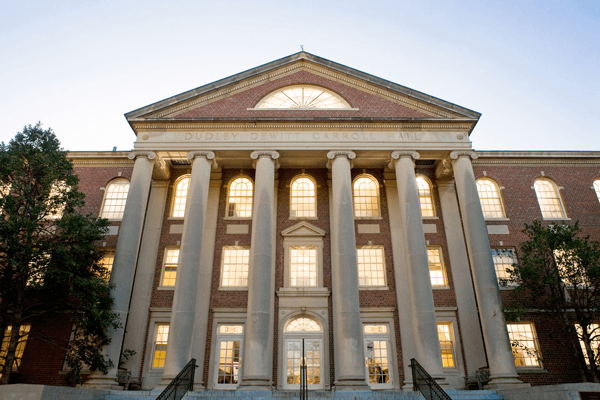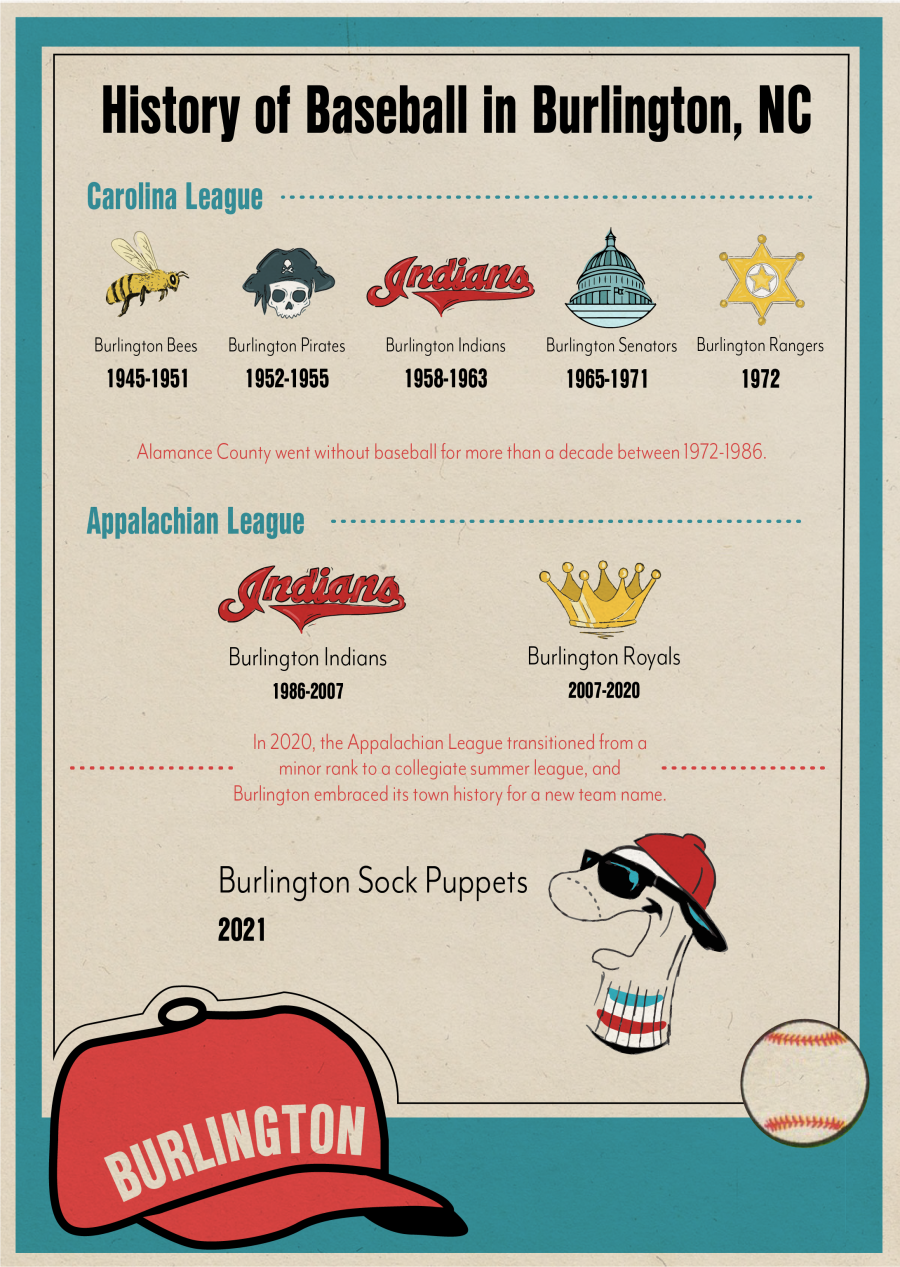
Story by Brian Keyes, Graphics by Hailey Haymond, Photo by Gabrielle Strickland
The history of baseball is interwoven with the history of Burlington.
Before CC Sabathia was signing record-breaking contracts, he made a stop in Burlington. Before Manny Ramirez was winning championships with the Boston Red Sox or Jim Thome had started on his path to hitting the eighth most home runs in MLB history, they played in Burlington. And before anyone knew the names of Mel Stottlemyre, Tommie Agee, Luis Tiant, the three men made stops in Burlington.
Before any of that, before the first minor league team opened its gates in the city, baseball was entwined with the fiber of Burlington through the mill teams that made their home here. It was baseball in one of its earliest organized forms — day laborers taking time to play against teams from other textile mills and factories once work was completed.
Towns with a history like Burlington are why baseball is America’s game — no other sport links a community to its earliest origins like it does. And with the team’s infamous new name — the Burlington Sock Puppets — the organization is making an effort to promote the link between baseball and Burlington’s history as the “hosiery capital of the South.”
“I think baseball has a tradition unlike any other in this area,” Anderson Rathbun, general manager of the Sock Puppets, said. “Baseball has been here for centuries.”

Anderson Rathbun, General Manager of the Burlington Sock Puppets, poses for a portrait in the seats of the Burlington Athletic Stadium.
But for a moment, it looked like Burlington might lose its link to that history.
Everyone who was paying attention knew that Major League Baseball was making changes to the minor leagues. Rumors about a new, smaller farm system started bubbling up not too long after the 2019 season came to a close.
The official reasoning behind it was pretty simple: most minor leagues were relics of a bygone era that didn’t make sense for a national organization trying to effectively manage thousands of players across the country. The MLB decided it was going to lower the total number of teams, cutting out short-season leagues like the Appalachian League where the Burlington team plays, and try and condense everything to reduce travel.
In the past you’d maybe be a team in North Carolina, and driving past (another North Carolina team) right through another city, and you couldn’t play them because they weren’t in your league,” said Dan Moushon, president of the Appalachian League and former general manager of the Burlington Royals. “And you might drive farther north to play a game in New Jersey.”
That decision left a sour taste in the mouths of many who love baseball because of its connection to history. It also left towns like Burlington in something of a scramble to find out what, exactly, was happening to their local institutions.
“To have MLB kind of kick the ladder out from under us was upsetting,” Burlington mayor Ian Baltutis said.
Perhaps the biggest problem was that, in a small city like Burlington pop. 53,000), having a baseball team becomes a huge part of the local identity.

Without the team, there would be no more summer night games for families to bring their kids to. No more quirky stories, like two men going on a quest to find out whether bringing a player a hotdog years ago cost him his playing career. And no more local flavor, like the game that once lasted for more than eight hours and 27 innings between the Burlington Indians and the Bluefield Orioles. Or the little-known fact that the stadium where the team plays is the last standing venue to be featured in the movie “Bull Durham.”
Sure there are other nearby teams like the Durham Bulls or the Greensboro Grasshoppers, but there’s something to be said for a city claiming something as its own.
“Traditionally, the community has stood on its own,” Hardin Watkins, the Burlington city manager, said. “In other words, we’ve had our own minor league baseball team, we have our own shopping areas, we have our own theaters, we have our own indoor swimming pool. Everything that you find in Greensboro and Raleigh, you can find a version of that here. We are linked, but I think the spirit exists here that we have our own team and we have our own source of entertainment.”
Part of the issue for Burlington was that the city had pumped a lot of money into Burlington Athletics Stadium, where the Sock Puppets call home, over the past several years. Renovations to the club house, the bathrooms, new paint on the grandstand and a playground for kids were all paid for by the taxpayers.
“I know one of MLB’s big, sticking points was that some communities haven’t invested in their stadiums,” Baltutis said. “And we kind of kept calling BS on that, because we’d been making the investments that they’d asked for.
“It was just a frustrating process, because every time we tried to kind of respond to their concerns, they came up with new concerns and new reasons why they were dissolving the league. So, we felt that we were being lied to and deceived at multiple points along the process. But again, our goal was to be collaborative and helpful and kind of find a pathway forward for baseball in whatever form.”
City officials in Burlington went to work trying to apply pressure however they could to make sure there was still a team in Burlington next year. They spoke with members of Congress to use their connections to start a conversation with the MLB about what the future of the Appalachian League might look like. After all, everyone, even politicians, would hate to see their town lose baseball.
It became clear very quickly that the MLB wanted to prioritize keeping baseball in the cities it was already in, just in a new form. The idea of a collegiate wooden bat league came about, with the plan being to turn the Appalachian League into something like a Cape Cod League “South,” only with 300 of the best freshman and sophomore players instead of the juniors who play in New England.
“It fit what they (MLB) were looking for,” Moushon said of the newly made Appalachian League. “They wanted kind of a stepping stone, so you can come to our league, and then progress to the Cape Cod after that. It was just a niche they thought they needed, and I guess all the stars aligned.”
Now, the Appalachian League is run in a joint effort between the MLB and USA Baseball, the national governing body for the sport. And with the new league came 10 new names, all to highlight the local history of the team’s respective cities. The Sock Puppets tying themselves even more closely with Burlington and its history makes sense — the team owner, Ryan Keur, was the former general manager of the Burlington Royals and already had connections in the area.

After purchasing the team following the 2019 season, he and Rathbun went to work at keeping the organization closely tied with the various stakeholders and community leaders in Burlington by organizing meetings throughout the offseason.
So far, Rathbun and Keur’s efforts have paid off. City officials in Burlington consistently praised the way the Sock Puppets organization has managed itself during the transition and how it’s honoring Burlington’s history with the team name.
“We’re very excited about it,” Watkins said. “Ryan’s got an amazing track record in baseball, here in Burlington, Daytona Beach, where he used to work before he bought the team. And I think that enthusiasm has carried forward. I think they did a really, really, really good job.”
More than just branding though, the Sock Puppets have actually partnered with one of the apparel companies still based in Burlington — OT Sports, one of the largest producers of apparel for minor league baseball. Shirts and hats are already available with the team’s eponymous sunglasses-wearing sock puppet mascot.
OT Sports, co-founded by Scott Gollnick, is just one of a dozen or so heritage textile manufacturing companies that Rathbun said the team plans to partner with throughout the coming season.
“It’s kind of fun, where you almost have that now mill/baseball team partnership that existed 100 years ago,” Gollnick said. “We saw we’re kind of bringing that back in the cooperative in the mutual support we’re providing one another.”
Despite the positive feelings and the excitement about keeping the team, it’s not like Burlington is just swapping out one team name for another — becoming a collegiate league opposed to a minor league is a serious change.
Team and city officials have said that there’s been some concern from fans that the level of play is going to drop, but they’re hopeful that the baseball will actually get *better* as a result of having the young stars from college baseball spread out among the 10 teams in the new league.
In the end, most people are content with the fact that baseball will be staying in Burlington.
“The name on the chest may change but the name of the game still the same,” Rathbun said. “And (we’re going) to honor baseball, honor our history, and have a lot of fun during the summer.”
 Stories from the UNC Media Hub are written by senior students from various concentrations in the Hussman School of Journalism and Media working together to find, produce and market unique stories — all designed to capture multiple angles and perspectives from across North Carolina.
Stories from the UNC Media Hub are written by senior students from various concentrations in the Hussman School of Journalism and Media working together to find, produce and market unique stories — all designed to capture multiple angles and perspectives from across North Carolina.



